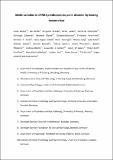Allelic variation in CRHR1 predisposes to panic disorder : evidence for biased fear processing
Abstract
Corticotropin releasing hormone (CRH) is a major regulator of the hypothalamicpituitary-adrenal (HPA) axis. Binding to its receptor CRHR1 triggers the downstream release of cortisol, a hormone needed for regulation of stress responses. Biochemical, behavioral and genetic studies revealed CRHR1 as a possible candidate gene for mood and anxiety disorders. Here, we aimed to evaluate CRHR1 as a candidate molecule in panic disorder (PD). Allelic variation throughout the CRHR1 gene was captured by 9 selected single nucleotide polymorphisms (SNPs); these were genotyped in 531 matched case/control pairs (discovery sample (n=239); replication sample (n=292)). Four SNPs were found to be associated with PD, in at least one sub-sample. The minor alleles of rs17689918 and rs17689966 were found to significantly increase risk for PD in females of the discovery, the replication and the combined sample, both withstanding correction for multiple testing (prs17689918=1.3*10-4; prs17689966=0.042). Expressional analysis demonstrated that both minor alleles of rs17689918 and rs17689966 significantly decreased CRHR1 mRNA in the forebrain and amygdala. Bioinformatical analysis revealed a high proportion of differential neuro-relevant transcription factor binding possibly underlying expression changes. When investigating the neural correlates underlying this association, risk allele carriers of rs17689918 and rs17689966 showed aberrant differential conditioning and safety signal processing arguing for predominant generalization of fear and hence anxious apprehension. Furthermore, the minor risk (A) allele of rs17689918 led to less flight behavior during fear provoking situations, but rather increased anxious apprehension and went along with increased anxiety sensitivity. Thus, reduced CRHR1 expression driven by CRHR1 risk allele leads to a phenotype characterized by a fear bias and hence sustained fear. These results strengthen the role of CRHR1 in PD and clarify the mechanisms by which genetic variation in CRHR1 is linked to this disorder.
Citation
Weber , H , Richter , J , Straube , B , Lueken , U , Domschke , K , Schartner , C , Klauke , B , Baumann , C , Pané-Farré , C , Jacob , C P , Scholz , C-J , Zwanger , P , Lang , T , Fehm , L , Jansen , A , Konrad , C , Fydrich , T , Wittman , A , Pfleiderer , B , Ströhle , A , Gerlach , A L , Alpers , G W , Arolt , V , Pauli , P , Wittchen , H-U , Kent , L , Hamm , A , Kircher , T , Deckert , J & Reif , A 2016 , ' Allelic variation in CRHR1 predisposes to panic disorder : evidence for biased fear processing ' , Molecular Psychiatry , vol. 21 , no. 6 , pp. 813-822 . https://doi.org/10.1038/mp.2015.125
Publication
Molecular Psychiatry
Status
Peer reviewed
ISSN
1359-4184Type
Journal article
Description
This work is part of the German multicenter trial ‘Mechanisms of Action in CBT (MAC)’. The MAC study is funded by the German Federal Ministry of Education and Research (BMBF; project no. 01GV0615) as part of the BMBF Psychotherapy Research Funding Initiative. The study was further supported by the DFG (Grant RE1632/5-1 and KFO 125 to AR; SFB TRR 58 Z02 to JD, PP and AR; C02 to JD and KD; DE357/4-1 to JD, AR, JR and AH; RTG 1256 to AR, JD and PP; IZKF-Würzburg Z-6 to HW).Collections
Items in the St Andrews Research Repository are protected by copyright, with all rights reserved, unless otherwise indicated.

